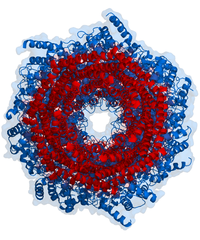
Photo from wikipedia
Physiological effects mediated by melatonin are attributable to its potent antioxidant activity as well as its role as a signaling molecule in inducing a vast array of melatonin-mediated genes. Here,… Click to show full abstract
Physiological effects mediated by melatonin are attributable to its potent antioxidant activity as well as its role as a signaling molecule in inducing a vast array of melatonin-mediated genes. Here, we propose melatonin as a signaling molecule essential for protein quality control (PQC) in plants. PQC occurs by the coordinated activities of three systems: the chaperone network, autophagy, and the ubiquitin-proteasome system. With regard to the melatonin-mediated chaperone pathway, melatonin increases thermotolerance by induction of heat shock proteins and confers endoplasmic reticulum stress tolerance by increasing endoplasmic reticulum chaperone proteins. In chloroplasts, melatonin-induced chaperones, including Clps and CpHSP70s, play key roles in the PQC of chloroplast-localized proteins, such as Lhcb1, Lhcb4, and RBCL, during growth. Melatonin regulates PQC by autophagy processes, in which melatonin induces many autophagy (ATG) genes and autophagosome formation under stress conditions. Finally, melatonin-mediated plant stress tolerance is associated with up-regulation of stress-induced transcription factors, which are regulated by the ubiquitin-proteasome system. In this review, we propose that melatonin plays a pivotal role in PQC and consequently functions as a pleiotropic molecule under non-stress and adverse conditions in plants.
Journal Title: Journal of experimental botany
Year Published: 2022
Link to full text (if available)
Share on Social Media: Sign Up to like & get
recommendations!